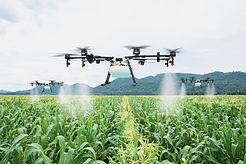Our Expertise
Our clients are the most ambitious fast scaling industrial technology companies, ranging from growth-stage startups to medium-sized global players. They are all working towards more sustainable tomorrow, and we are very proud to support every step of their journey.

Industry & Energy
The world needs to transition from coal- and gas-fired power plants to-carbon baseload power sources in order to achieve sustainability. This requires the development storage solutions to expand the usefulness of renewable energy sources, as well as improvements in energy efficiency and grid upgrades. To circularity, industries must be powered by low-carbon energy, improve energy and material input efficiency, and increasingly rely on bio- and waste-based inputs. Additionally, the development of carbon capture and storage should be seen a significant industry in itself.

Agriculture & Food & Water
In order to establish a sustainable food and agriculture system, it is necessary to transition towards low-carbon farming inputs, including biologicals, adopt more sustainable farming practices, and increase land-based carbon removal. Additionally, it is important to create low-car substitutes for high-carbon food products, such as animal proteins, and minimize food waste. It is also important to prioritize more efficient water transportation, implement decentralized water production setups, and address various forms of contamination, including PFAS and microplastics.

New Materials
In the market for sustainable technologies, low-carbon building materials are gaining traction, with innovations like carbon-sequestering concrete and cross-laminated timber leading the way. These materials not only reduce emissions but also offer durability and cost-effectiveness. Novel heating and cooling technologies such as advanced heat pumps and smart thermostats are revolutionizing energy efficiency in buildings, providing significant savings on energy bills while reducing environmental impact. Meanwhile, the sustainable packaging market is expanding rapidly, driven by consumer demand for eco-friendly options. Innovations like plant-based plastics and compostable packaging are becoming mainstream, helping companies reduce their carbon footprint and appeal to environmentally conscious consumers.

Circularity
The concept of circularity is transforming industries by promoting sustainable practices that extend the lifecycle of products, and technology is at the forefront of this transformation. Recycling technologies, such as advanced sorting systems and chemical recycling, are making it easier to convert waste materials into new products, reducing the need for virgin resources. Reuse is being enhanced by digital platforms that facilitate the sharing and resale of items, extending their useful life. Refurbishment is benefiting from innovations in diagnostics and repair technologies, allowing used products to be restored to like-new condition efficiently. Product as a Service (PaaS) leverages IoT and data analytics to offer customers the service a product provides rather than ownership, encouraging manufacturers to design durable, long-lasting products.
Our Impact
100% of recruited leaders have fulfilled or exceeded expectations
We deliver a typical CxO search project in 8-10 weeks start to closure

50% of the industrial leaders we recruited added deep diversity & 40% were women
We have recruited teams across 30 countries in 5 continents
Get Inspired
















